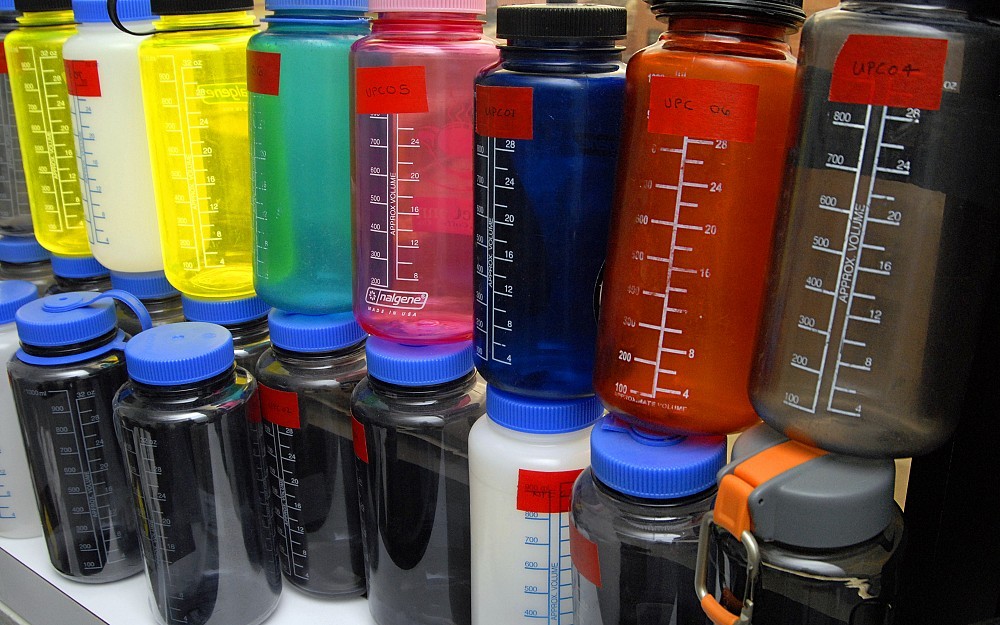
Hot Liquids Release Potentially Harmful Chemicals in Polycarbonate Plastic Bottles
CincinnatiWhen it comes to Bisphenol A (BPA) exposure from polycarbonate plastic bottles, its not whether the container is new or old but the liquids temperature that has the most impact on how much BPA is released, according to University of Cincinnati (UC) scientists.
Scott Belcher, PhD, and his team found when the same new and used polycarbonate drinking bottles were exposed to boiling hot water, BPA, an environmental estrogen, was released 55 times more rapidly than before exposure to hot water.
Previous studies have shown that if you repeatedly scrub, dish-wash and boil polycarbonate baby bottles, they release BPA. That tells us that BPA can migrate from various polycarbonate plastics, explains Belcher, UC associate professor of pharmacology and cell biophysics and corresponding study author. But we wanted to know if normal use caused increased release from something that we all use, and to identify what was the most important factor that impacts release.
Inspired by questions from the climbing community, we went directly to tests based on how consumers use these plastic water bottles and showed that the only big difference in exposure levels revolved around liquid temperature: Bottles used for up to nine years released the same amount of BPA as new bottles.
The UC team reports its findings in the Jan. 30, 2008 issue of the journal Toxicology Letters.
BPA is one of many man-made chemicals classified as endocrine disruptors, which alter the function of the endocrine system by mimicking the role of the bodys natural hormones. Hormones are secreted through endocrine glands and serve different functions throughout the body.
The chemicalwhich is widely used in products such as reusable water bottles, food can linings, water pipes and dental sealantshas been shown to affect reproduction and brain development in animal studies.
There is a large body of scientific evidence demonstrating the harmful effects of very small amounts of BPA in laboratory and animal studies, but little clinical evidence related to humans, explains Belcher. There is a very strong suspicion in the scientific community, however, that this chemical has harmful effects on humans.
Belchers team analyzed used polycarbonate water bottles from a local climbing gym and purchased new bottles of the same brand from an outdoor retail supplier.
All bottles were subjected to seven days of testing designed to simulate normal usage during backpacking, mountaineering and other outdoor adventure activities.
The UC researchers found that the amount of BPA released from new and used polycarbonate drinking bottles was the sameboth in quantity and speed of releaseinto cool or temperate water.
However, drastically higher levels of BPA were released once the bottles were briefly exposed to boiling water.
Compared to the rate of release from the same bottle, the speed of release was found to increase from 15 to 55 times faster, explains Belcher.
Prior to boiling water exposure, the rate of release from individual bottles ranged from 0.2 to 0.8 nanograms per hour. After exposure, rates increased to 8 to 32 nanograms per hour.
Belcher stresses that it is still unclear what level of BPA is harmful to humans. He urges consumers to think about how cumulative environmental exposures might harm their health.
BPA is just one of many estrogen-like chemicals people are exposed to, and scientists are still trying to figure out how these endocrine disruptorsincluding natural phyto-estrogens from soy which are often considered healthycollectively impact human health, he says. But a growing body of scientific evidence suggests it might be at the cost of your health.
UC graduate student Hoa Le and summer undergraduate research fellows Emily Carlson and Jason Chua also participated in this study, which was funded by a National Institute of Environmental Health Sciences grant.

Scott Belcher, PhD, studies effects of Bisphenol A on brain development.
Tags
Related Stories
UC study finds vision loss fear may keep some from having...
April 23, 2025
A new University of Cincinnati study finds vision loss fears may deter some patients from cataract surgery, despite it being the only effective treatment. The research underscores the role of doctor-patient relationships in medical decisions.
UC researcher develops at-home diagnostic test for endometriosis
April 21, 2025
Katherine Burns, a University of Cincinnati researcher who has endometriosis, speaks about her journey of developing a non-invasive diagnostic test for the condition.
Music as Medicine: World Voice Day shines a light on healing...
April 18, 2025
On April 16, 2025, voices filled Cincinnati Music Hall — not just with song, but with purpose, for World Voice Day: Music as Medicine — a vibrant celebration of the healing power of voice and music.
